social bookmarking tools:
 |
|
| Available RSS Feeds |
|---|
 - Top Picks - Top Picks |
 - Today's Music - Today's Music |
 - Editor's Blog - Editor's Blog
|
 - Articles - Articles
|
Add Louisville Music News' RSS Feed to Your Yahoo!
|
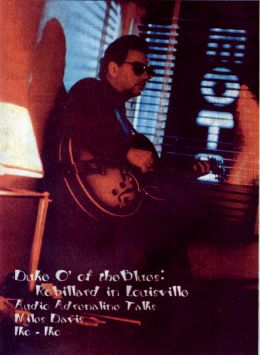
Duke O' The Blues:
An Interview with Duke Robillard
By Tim Roberts
Cover photo by Jeff Dunas
"Sorry it's taken so long to do this," Duke Robillard said the night we talked over the telephone, his soft voice tinged with a chuckle. "I'm a busy guy." tim had been wanting the chance to splash Duke on the cover for the last year-and-a-half and to write a story to back it, something that's hard to do with a man who spends most of his time away from his Louisville home touring, recording, producing: in short, being a musician in demand.
Minutes before I called, he was in the middle of packing for another tour that would burn through most of March. The night before, he and his wife Susannan, along with bassist Jimmy Brown and drummer Jeff McCallister, played two long sets at Air Devils Inn, the rugged, low-ceilinged nightspot across from Bowman Field. The jammed-to-the-walls crowd was mixed in age, race and dress - biker leather meets Izod. All had a single element in common: a love for Duke Robillard and his blues.
Born in Woonsocket, a small French town in Rhode Island, Michael John "Duke" Robillard turns 50 this year. More than half of his life has been spent in music. He started by playing ukulele, a gift from his sister.
"I'd go sing for anybody," he said. "After lunch in school, I'd entertain everybody in the schoolyard, and I'd offer to sing in class."
Inspiration came from Buddy Holly and the bluesy flip sides of hits from Chuck Berry, which he claimed were the first blues he ever heard.
"I didn't know it was blues. I had no way of knowing anything about where I came from. There was no black culture at all. I would see Chuck Berry and Fats Domino on American Bandstand, and the popular artists that were in the rock and roll realm that were really just playing blues with a beat."
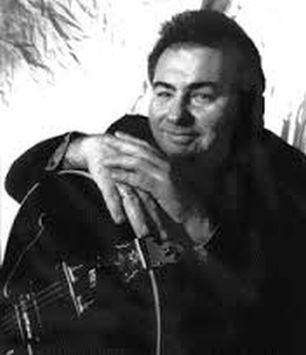
From this inspiration came a career that ranges over the many blues styles, from hard-driving, wailing blues to swing, from horn-based rhythm-and-blues to sultry, slow rock. In addition to his years of solo work, this founder of Room Full of Blues (his first commercial band) and former member of the Fabulous Thunderbirds has played with and produced for dozens of blues artists: Muddy Waters, Jimmy Witherspoon, Jay McShann. He is a W.C Handy Award nominee in the Best Blues Instrumentalist Guitar category. His music has been used in the gritty NBC cop-drama Homicide, and his most recent honor was as guitarist on three tracks from Bob Dylan's Grammy-Award winning time Out of Mind. Which, as Duke described, almost didn't happen for him.
Scott Mullins, CEO, President and Main Fool of Rollin' & Tumblin' Records, and host of WFPK's "Saturday Night Blues Party," summarized Duke Robillard as "one of the most outrageously talented musicians in the world. He is well-rooted in the tradition of the music. His versatility is amazing."
Duke felt just as positive about himself. "Things are coming together nicely for me in my. . .what is this, late middle age?" he said, referring to the onset of his fiftieth birthday. I began our discussion by asking him for a summary of his early professional years.
LMN: What was your first blues band?
Duke: When I was in high school, I had these bands that played a variety of material, and we always played blues along with it. We also played stuff from the British groups, then we'd some times do blues songs we learned from them. But I also knew what we were playing was American music, and I was just finding out where it all came from. Besides listening to the backs of Chuck Berry records, I was just starting to discover Howlin' Wolf, Muddy Waters, Sonny Boy [Williamson].
Right after I got out of high school, I decided I wanted to play blues exclusively and got serious about it. I started this band called Roomful of Blues. It was a really good unit, a very young band. When I listen to tapes of them now, it's amazing how we sounded like the real stuff. It really had a mature sound to it, really laid back, in the pocket, nobody was playing a million notes. For some reason we picked up on the authenticity of it.
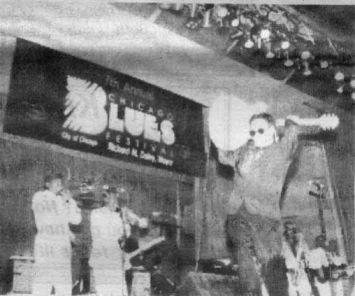
LMN: Let's skip ahead to your time with the Fabulous Thunderbirds.
Duke: When they started touring, looking for places to play, they came up to New England one time. They heard about [Roomful of Blues] and came to see us. They just flipped out. They loved us. I went to see them in Boston the following night and became instant fans of theirs.
All through the years, through the 70s and 80s, we were fans of each other. We jammed and did a lot of gigs together. They recorded a tune or two of mine. We just had a lot of interplay between the groups. They would use our horn section, or I would sit in with them. We always joked that if Jimmy [Vaughn] and Kim [Wilson] couldn't work together, I would. So when Jimmy decided that he needed to leave the band, he just said 'Call Duke.' [Laughs] And that's what they did. By that time the bass player and drummer were the guys that had been in Roomful of Blues from the early days. So it was a pretty comfortable situation.
LMN: When did you finish with them?
Duke: Late 1992. I had started with them in June of 1990.
LMN: How about your solo career?
Duke: I recorded for Rounder Records for about 10 years. I left Roomful in late 1979, did a few stints with other people. Then I decided to have a smaller band and concentrate on my guitar playing, so I pretty much worked in a trio or quartet format for the ten years following that, where I made several albums for Rounder.
LMN: Did you like your experience with Rounder?
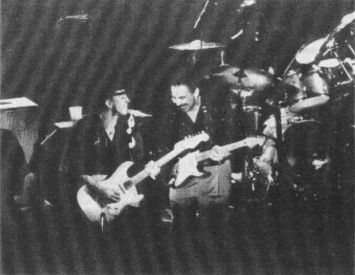
Duke: Yeah! They're a great label. I thought they were great when I was with them, but they didn't have a lot of money to promote their artists at that time. And that was a bit frustrating. But they've gotten a little further ahead with that now. They've grown a lot. So it's more advantageous to be on that label now that it was when I was there.
LMN: And now you're with Pointblank.
Duke: It's a subsidiary of Virgin Records. . .
LMN: That's a pretty colossal outfit.
Duke: Oh, yeah, yeah. When I left the Thunderbirds, I went right into Allen-Martin Studios here in Louisville, when Nick Stevens was over there. I had a solo album I mixed with him, one I had done in Rhode Island. That worked out well. Nick and I struck up a good relationship, so I went in to Allen-Martin and started recording on spec.
LMN: Which album was this?
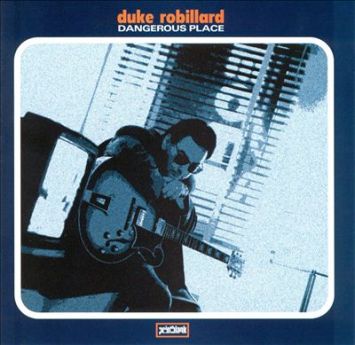
Duke: Temptation. More a blues-rock-oriented album. And it got the attention of a longtime fan and friend Mike Kappus, owner of the Rosebud Agency in California. He wanted to try to get me a deal because he felt strongly about the album. He made me a deal with Pointblank and I ended up working with his agency, which is probably the most prestigious roots blues agency in the country. They represent John Lee Hooker, Robert Cray, and a lot of other neat people.
LMN: Did Tempation bring you down to Louisville?
Duke: No, actually, my wife [Susannan] brought me down to Louisville.
LMN: How'd she get you here?
Duke: Well, we met during the first gig I ever played in Louisville. I think it was called Hugs or something, downtown across from the Brown Hotel [now Rick's Square Piano]. There weren't an awful lot of people there that night, but I did get to meet Scott Mullins with the Kentuckiana Blues Society. I think I also might have met Jimmy Brown that night. And a lot of people from the blues community came out, including Susannann.
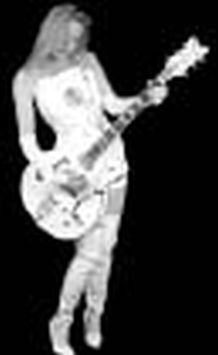
Scott Mullins had told me about her, said that she had an interesting style of singing that was rock-and-roll but blusey. I met her, we kinda became friends, and she talked about maybe me playing guitar with her at some point. She was actually living in California at the time. Over time we ran into each other here and there. We did some recording together. One thing led to another. And the rest is history, I guess. We had decided when I joined the Thunderbirds that we would get married here.
LMN: How long have you two been married?
Duke: Going on eight years.
LMN: Let's talk about the differences in sound, from Temptation to your latest, Dangerous Place. You said Temptation was more blues-rock. When we go into Dangerous Place, it sounds like a tribute to that horn rock you listened to so long ago.
Duke: It goes back to the sound I had with Roomful of Blues. My Duke's Blues album, which I had done as an tribute to my inspirational heroes, received so much acclaim and was so popular that it became obvious there was a large audience that wanted me to play in that traditional sound, which I love. But I didn't have a desire to go backwards and do what I did 20 years ago. Although the music style is totally natural to me, I decided I would write an album of material Dangerous Place of stuff that is influenced and in the style of the old rhythm and blues that spans from the 40s through the 60s, and just make my own sound with it. I tried to bring it up-to-date and make the songs have some kind of connection with today's world, but with the feeling of that old music. I thought it would be a hard thing to accomplish, but it turned out to be a natural sound. I wrote a lot of the songs as I recorded it. It all fell right together.
LMN: I noticed in the liner notes that you use a lot of older instruments on Dangerous Place, authentic instruments from the 1950s. . .
Duke: I love the arch-top guitar, whether it be acoustic or electric. It was the real American guitar, used in all the big bands when it was an acoustic instrument, and it was the guitar chosen as the one that would become the electric guitar. I do use a lot of those instruments as part of my live show. I use a bevy of guitars because I'm just a lover of all the different sounds that can be extracted from them. It still gives me a thrill to be able to just play and get a lot of different sounds, playing a lot of different styles.
LMN: One of the times we talked about a month ago you had mentioned the collection of guitars you have. You collect them and actually use them?
Duke: I don't consider myself a guitar collector. I change guitars often, I trade them in, and I'm always on a quest for something that's gonna have a different sound or make me play a different way, which is something I want to experience on these great old instruments, especially the arch-top. They're more popular today than they have been in years, but still not a lot of people are playing them, especially the acoustic models. I like to keep it alive. It really expands my knowledge and they're a big part of my inspiration.
LMN: Is any one guitar harder to play than another?
Duke: Oh, they're all different. Part of my philosophy when I get these instruments is to restore them to the best playing condition without altering them in any way that would take away from their aesthetic or monetary value. Maybe re-fretting one, having some neckwork done, or setting it up a certain way to get the most out of it, so that when I'm finished with the guitar somebody else who buys it will, I hope, be a guitar player and really use the instrument. They're meant to be used and they sound better the more they're played. I don't like the idea of them going into a collection.
LMN: Let's go in a different direction. You were part of Bob Dylan's Grammy-winning Time Out of Mind. What was that like for you?
Duke: A lot of people have made me realize I'm more a part of it than I might have initially felt being a sideman. It's certainly a great honor to be on the Album of the Year. I was personally invited by Bob Dylan himself to be on it. The producer [Daniel Lanois] didn't want me to be there because he and I were competing for the same role. That was evident to me [Laughs]. But it was obvious Dylan really wanted me there. I was the closest person to him, physically, for nine days, twelve hours a day. It was a great experience to see how he worked and watch the process that he goes through.
LMN: How do you know Bob Dylan?
Duke: The only way I know him was through the Fabulous Thunderbirds. We opened for him in some theater in Los Angeles. He was in the wings, listening. And he really liked my guitar playing. In fact, as soon as I left the Thunderbirds, when I started recording Temptation and putting my trio together, I was invited to audition with him to possibly do a recording. I declined the audition because I knew I wanted to pursue my own career at that point. But I said I would love to record with him. He remembered that. When he got in the studio and got things rolling, he decided he wanted me in there. He called and got me there the next day.
LMN: What other performers have you worked with?
Duke: Oh, God. [Laughs] The list is just too long. There are just so many.
LMN: I'll put it this way: which was your most memorable performance with one of the big names?
Duke: I'd have to say playing with Muddy Waters the first time. I was young, sometime in the early 1970s. I went down to see Muddy, and my manager at the time convinced him that he should let me sit in with him. Late in his career, Muddy let a lot of people sit in, but at that time he wasn't keen on letting just anybody out in the audience come up and play. So it was kind of a feat to convince him to let me sit in. Once he did, he went crazy. He just loved me. He was working at the same club every night for a week in Boston and I'd go see him after my shows. The strange thing is, he'd get me on stage as soon as I walked in the door. But that first time I played with him was a magic moment. It was the first time I had played with one of my heroes, who were larger-than-life people. To have his approval was just one of the greatest things for me. It let me know I was doing the right thing.
LMN: Let's talk about the local scene for a bit. Did you know Jim Rosen [harmonica player and vocalist for The Mudcats Blues Band]?
Duke: I did know Jim, but not well. He was a friendly guy, and anytime I ran into him in town, we'd talk a lot about blues. He always impressed me with how serious and devoted he was to it.
LMN: His recent death has touched a lot of people in this city, including the fans. That's one thing I've noticed about blues musicians here in Louisville: they seem closer to their audience. Do you think that's true of all blues musicians? More so than rock or even jazz performers?
Duke: Absolutely! Blues music is really about being in touch with people. The nature of the music singing about things that are close to the earth, what daily life is all about and what problems every man and woman go through is just basic and general. I think most of the people who play blues tend to be very humble people and honestly want to do something to make people feel good. You don't meet that many blues artists that have the "star attitude." Most of them are regular people, anywhere you go all over the world.
LMN: How about some of the newer, up-and-coming young blues musicians?
Duke: Ah. . . .[Laughs softly] I don't have an awful lot of an opinion about that. It's tough for me to talk about this because it might almost sound like I might feel bitter, which I don't. But sometimes I do think it's kind of ridiculous, no matter how obviously talented to a certain degree some of these kids are for their age. . . .[Pauses] When I was 17, I was a good musician, too, a serious musician. And sometimes I have to say that I'm not so sure it's good for them to get to the level they do if they're serious about this kind of music so early. It becomes kind of a cult thing, almost a pop thing totally unrelated to what the blues environment is really all about.
Of course there's nothing wrong with success. For instance, Johnny. Lang, who's got some talent no doubt about it had a Disney special. This kid's been playing guitar only a couple of years. There are some serious blues artists out there who have never gotten a break, never gotten the recognition they deserve, who do it right. It's just kind of ironic that a cute teenager can get the Disney machinery behind him in the name of blues. I know he's talented and I think he's good. It's just there's something about this culture that feeds off youth and, in some ways, is a little bit shallow. There's certainly nothing wrong with the energy of youthfulness. But in other countries, people have more reverence for others who have worked at their craft for a long time. Let's face it, how well can your craft be honed at seventeen years old, no matter how good you are? Realistically, there's only so much you can accomplish musically at that level.
LMN: Disney owns everything else, so they might as well own the blues, too.
Duke: Yeah, and that's a sad state of affairs. All of a sudden, when blues becomes big business, it's not the blues anymore. That doesn't mean you can't be successful. B.B. King is the perfect example of someone who worked a long time to get his success, and his came pretty late. John Lee Hooker's an even better example. He was over 70 when he started selling millions of records. To see that that is possible is a beautiful thing. Blues can reinvent itself and has reinvented itself and shown up in a million different forms, and it will continue to do that.
LMN: Speaking of reinventing, what's coming up for you?
Duke: I've been thinking about that a lot. Actually, I've finished with Pointblank, but it's possible I may continue for another album or two. I'm basically finished with that contract. I will be label-shopping. I also have new people in my touring group. And I've been wondering what I going to do next. If it's going to sound ordinary, just like something else, then there's almost no reason to make a record. I'm not going to say what it is, but I do have some basic concepts of a direction to combine the old and the new, and come up with something with some uniqueness to it. I just started talking about it with my band and management, and starting to get a feel about what it's going to be. I'm hoping that it develops.
The next Louisville performance by Duke and Susannan will be the Duke Robillard Easter Weekend/Pre-Derby Bash on April 10 and 11, at Air Devils Inn. From the middle of May through most of June, he'll be on an intercontinental tour that will include Hong Kong, several cities in France, and the Greek Islands.
Find out more about Duke's tour at www.rosebudus.com/robillard.html.
